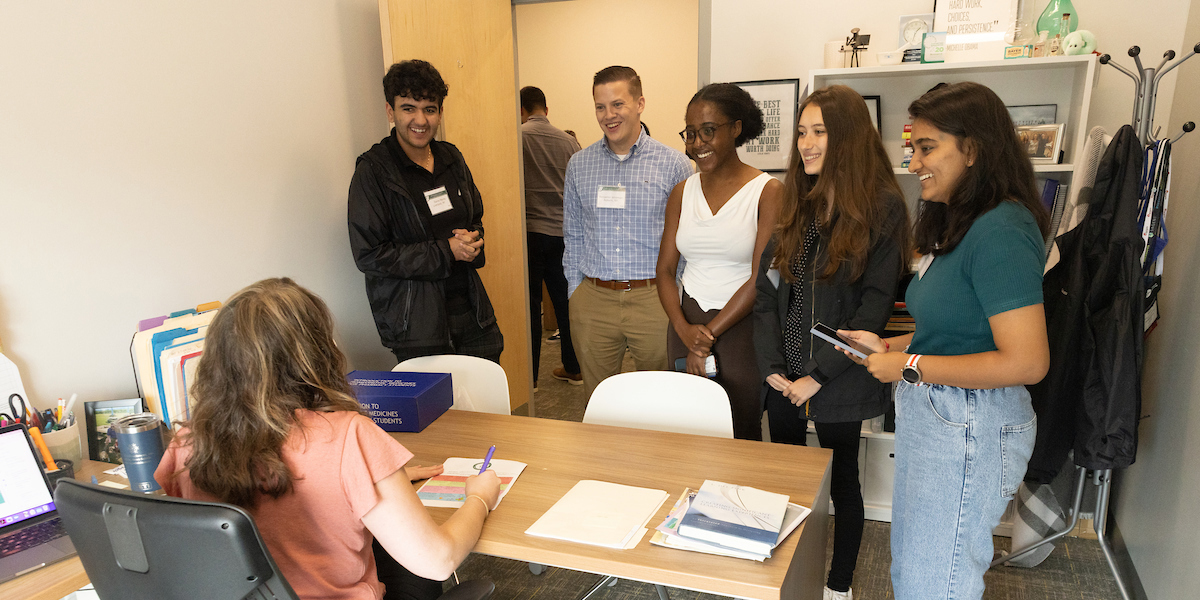New PharmD students get acclimated

After checking in and picking up a swag bag including a tie-dyed class T-shirt, Binghamton University’s incoming Doctor of Pharmacy students spent Aug. 22 learning about the school, available resources — and where to find everything!
Following a welcome from Dean Kanneboyina Nagaraju, (see sidebar), students signed their names to a poster that highlighted the school’s core values. The list is long, but represents the values the School of Pharmacy and Pharmaceutical Sciences hopes all students will embrace.
Orientation, which was pared down from a two-day event to one in-person day and some online work, included common activities such as a review of policies, procedures and expectations, but also included a few new twists.
Aaron Beedle, associate professor and chair of the Department of Pharmaceutical Sciences, led the Orientation planning and implementation this year and included brand-new programming that had never been done before.
“I wanted to bring in more opportunities for students to interact with each other and do things that would be useful,” she said. “A sense of belonging is an important component of student success, so having small-group activities and having the students switching between groups gave them more touchpoints with other students.”
Working with a small planning committee of faculty and staff, Beedle developed three sessions — called student success panels — that each focused on a different aspect of the students’ education: academics, their inspiration to be a pharmacist, and how to build community and deal with stress.
In addition to the student success panels, and rather than having the students sit at tables and desks all day listening to someone talking, they were sent on a treasure hunt. “The hunt helped to give them place location,” Beedle said. “’If I want to see this particular faculty member, I now know where she is located.’
“A key part of the hunt was trying to orient students to locations in the building as a fun activity, but with a group to build the sense of belonging,” she added.
Amanda Padwa, a member of Beedle’s committee and integral to the day’s success, organized the treasure hunt groups so they each included a student who had been at Binghamton University as an undergraduate, but also with hometown diversity. “A lot of Binghamton students knew each other, so our intent was that every group had someone who knew something!” Beedle said. “And the winning teams received tickets to a Rumble Ponies baseball game.”
The hunt didn’t just ask students to find people and places at the Health Sciences Campus, but also to find things like the University Counseling Center hours, phone number and location; the website for the Q Center and Multicultural Resource Center and locate them on the campus map; and where they could find assistance for other resources.
“We’re trying to create the relationships and interactions between students at this early phase,” Beedle said. “Students often form a group early and we wanted to split those students up to give them more exposure to each other.”
Students rotated in groups through each student success panel.
“The academic success session was developed to demonstrate to the new students that certain behaviors can be problematic and end up setting a student up for failure,” explained Beedle, who led the session. The new students were given three case studies to discuss: a student who pulls all-nighters cramming for exams; another who studies all the time with few breaks; and a third who let stressful family issues negatively affect study group relationships.
“If these behaviors happen and aren’t corrected, it’s hard for a student to catch up,” Beedle said. With the guidance of current fourth-year students, the new students worked through the problematic behaviors in the case studies.
“This took it away from the personal and introduced students to the idea that there are things that can happen that can be problematic. It put students in a situation where they could see what kind of outcome they might have from that behavior, so they recognize they need to use effective methods and also look after themselves,” she said.
The academics’ session was always envisioned with student facilitators, and that’s what made it work, Beedle said. “They were discussing behaviors these current students had seen. Part of the goal of facilitation with fourth-year students was that, in small student groups, a shy student might be more likely to engage with a peer.”
Rachel Klosko, clinical assistant professor of pharmacy practice, led the inspiration for pharmacy session with the assistance of three current students who each spoke about what had inspired them to select pharmacy as a career — on a non-traditional student who knew he could do more with his life, one who was inspired by her grandmother to help people get off unnecessary medications and another who wants to become an oncology pharmacist after a relative died of an unknown blood clotting disorder while undergoing chemotherapy.
“The motivation was for the entering students to think about why they chose pharmacy and frame their thoughts about it,” said Beedle. “The new students then responded to questions with reflections on their motivation.”
In the third student success panel, led by Andrea Snyder, students had some hands-on work to do — trying in groups to get a helium stick safely to the ground as a team, without anyone losing finger contact. Easier said than done!
Discussions following the activity included talking about collaborating to find the method that would work best for the group. Stress was also a topic, since trying to lower the stick to the ground was difficult. Students tried switching positions, lining up their fingers and putting their fingers in different places, even as some tried to motivate the group, others to lead it and others to bend the rules.
The end result? Students tended to take on different roles, but realized that there are different stressors and strategies when lowering a helium stick to the ground — as well as when navigating pharmacy school.

